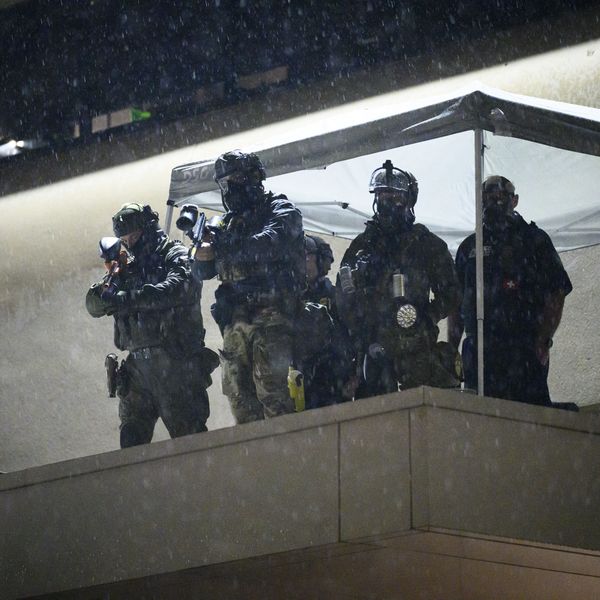Following earlier indications that such attacks were likely, the U.S. military bombarded targets in the Iraqi city of Tikrit overnight as it took a commanding role in an ongoing offensive against Islamic State (ISIS/ISIL) militants that has so far been spearheaded by Iraqi forces and Shi'ite militias which receive direct backing and guidance from the Iranian military.
"These strikes are intended to destroy ISIL strongholds with precision, thereby saving innocent Iraqi lives while minimizing collateral damage to infrastructure," said Lt. Gen. James L. Terry of U.S. Central Command as he confirmed the bombing effort late on Wednesday. "This will further enable Iraqi forces under Iraqi command to maneuver and defeat ISIL in the vicinity of Tikrit."
The Washington Post reports:
Pentagon officials said that the Iraqi government had requested the assistance as the fight for Tikrit stalled as it moved into its fourth week. They said initial targeting for the strikes will be aided by U.S.-led coalition surveillance aircraft that recently began flying over the city, 110 miles northwest of Baghdad.
The fight for Tikrit is considered a crucial test for larger future objectives, including Mosul, Iraq's second-largest city, which has been the symbol and center of Islamic State power in Iraq since the militants took it last summer.
According to Reuters:
The decision to give air support to the Tikrit campaign pulls the United States into a messy battle that puts the U.S.-led coalition, however reluctantly, on the same side of a fight as Iranian-backed militia in a bid to support Iraqi forces and opens a new chapter in the war.
It also appeared to represent at least a tacit acknowledgement by Baghdad that such airpower was necessary to wrest control of the hometown of former Iraqi dictator Saddam Hussein from Islamic State fighters, after its attempts to go it alone stalled.
With ongoing and escalating fighting in Yemen in recent days, including a wave of airstrikes led by Saudi Arabia, the greater Middle East region is now awash in a complex web of violence in which proxy battles, influxes of weapons and soldiers, and cross-border sectarian divisions are feeding violence in myriad ways.
As Middle East historian Juan Cole points out, the U.S. military on Wednesday into Thursday was assisting the Saudi bombing of the Iranian-allied Houthi rebel targets in Yemen, while simultaneously collaborating (at least indirectly) with Iranian military advisors from the Iranian Republican Guard Corp in the operation against ISIS in Tikrit. "The US support for the Saudi air strikes and the new coalition makes the Yemen war now the second major air campaign supported by the US in the region," he writes. "But the one in Iraq is in alliance with Iran. The one in Yemen is against a group supported in some measure by Iran." According to Cole:
US air intervention on behalf of the Jerusalem Brigades of the IRGC is ironic in the extreme, since the two have been at daggers drawn for decades. Likewise, militias like Muqtada al-Sadr's "Peace Brigades" (formerly Mahdi Army) and League of the Righteous (Asa'ib Ahl al-Haqq) targeted US troops during Washington's occupation of Iraq. But the fight against the so-called "Islamic State group" or Daesh has made for very strange bedfellows. Another irony is that apparently the US doesn't mind essentially tactically allying with Iran this way - the reluctance came from the Shiite militias.
The takeaway, according to Cole, is that the U.S. military is "now involved in two air wars in the Middle East, not to mention more widespread drone actions" elsewhere. Amid all this violence, the prospect for peaceful resolutions anytime soon has dropped to nearly zero.
And the Washington Post adds:
...the Tikrit operation is fraught with potential political and strategic complications for the Obama administration. The overwhelming presence of Shiite militias and volunteers armed and advised by Iran has given rise to fears that their victory would promote sectarian divisions and bloodletting in the majority-Sunni city. U.S. officials have estimated that these Shiite fighters outnumber official Iraqi security forces and Sunni tribal forces by about 5 to 1 in the battle. [...]
Human rights groups in recent days have documented the Shiite pursuit of a scorched earth policy in areas already liberated from the Islamic State. After U.S. airstrikes drove the militants out of the town of Amerli, in northeastern Iraq, late last summer, the militias went on a sectarian rampage, burning and bulldozing thousands of homes and other buildings in dozens of Sunni villages.

